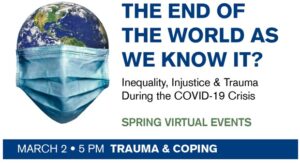 Join the College of Liberal Arts & Sciences on Tuesday, March 2, for a panel conversation on Trauma and Coping during the COVID-19 pandemic.
Join the College of Liberal Arts & Sciences on Tuesday, March 2, for a panel conversation on Trauma and Coping during the COVID-19 pandemic.
The panel is presented as part of the Without Limits events series, the flagship program engaging the campus community on topics and perspectives in the liberal arts, humanities and social sciences.
The Trauma and Coping panel gathers faculty with distinct critical perspectives for a conversation about how they, their families, their students and their disciplines have adapted to pandemic realities. The event will be moderated by Isidoro Janeiro, chair of the Department of Languages, Literatures & Cultures.
All members of the campus community and the public are invited to attend this presentation on Tuesday, March 2, at 5 p.m. Pre-registration is required to get the link; Please click here to sign up.
Participants and their discussion topics include:
 “Trauma and ‘The Hunger Winter’: Lessons for the 21st Century” – Kristopher Jansma (Creative Writing)
“Trauma and ‘The Hunger Winter’: Lessons for the 21st Century” – Kristopher Jansma (Creative Writing)
Early in the pandemic, I began a series of weekly check-in phone calls with my grandmother, Oma, and I brought up my concerns about the impact that the pandemic would have on my young children. Oma began to relate stories of a similar period in her own childhood during the Nazi occupation of Holland at the end of WWII, known as “The Hunger Winter” because of the starvation caused when resources were cut-off from the Dutch people after a coordinated resistance.
I’ll describe some of the ways in which fear and violence caused trauma that had lasting impacts on my grandmother’s physical and psychological health, and what that may tell us about the impact that the current pandemic may have on this generation of children. I’ll also discuss how narrative storytelling may give us ideas for ways to mitigate that impact over the long term.
 “The Coronavirus in Context: A Guide for Coping” – Jonathan D. Raskin (Psychology)
“The Coronavirus in Context: A Guide for Coping” – Jonathan D. Raskin (Psychology)
I will discuss how understanding the role of contexts can help people cope with the coronavirus pandemic. Contexts are sets of presuppositions that shape a person’s experiences.
Two very common contexts, mind and self, can inform our understanding of how people have responded to the coronavirus pandemic. The mind consists of a person’s defensive and protective postures in the face of perceived threat, whereas the self takes a broader perspective and emphasizes human connections and interrelatedness.
Awareness of several mind/self contrasts—blame versus responsibility, insufficiency versus sufficiency, being at effect versus being at cause, and avoidance versus mastery—can help improve coping in face of the coronavirus pandemic.
 “Welcome to Adulthood!: Coming of Age During a Pandemic” – Karla Vermeulen (Psychology, Institute for Disaster Mental Health)
“Welcome to Adulthood!: Coming of Age During a Pandemic” – Karla Vermeulen (Psychology, Institute for Disaster Mental Health)
While the pandemic has impacted everyone globally, the particular form that impact takes is specific to individual characteristics – including developmental stage.
Clearly there’s no good time of life to be locked down: Young kids are suffering from the delay of typical milestones and interactions that usually characterize childhood, while older adults may fear they don’t have enough time left to try to make up for missed experiences. What about emerging adults (ages 18 to 29), including most of our students?
Building on past quantitative and qualitative research, I will explore how the pandemic has added yet another layer of stress, anxiety, disappointment, and trauma for a generation that was already dealing with the threat of school shootings and other disasters, climate change, racial injustice, socioeconomic inequities, and student loan debt. Yet they’re fighting to continue their education and to take on adult responsibilities, demonstrating a collective level of resilience we should all respect.
Learn more online about the College of Liberal Arts & Sciences’ Without Limits events series.

